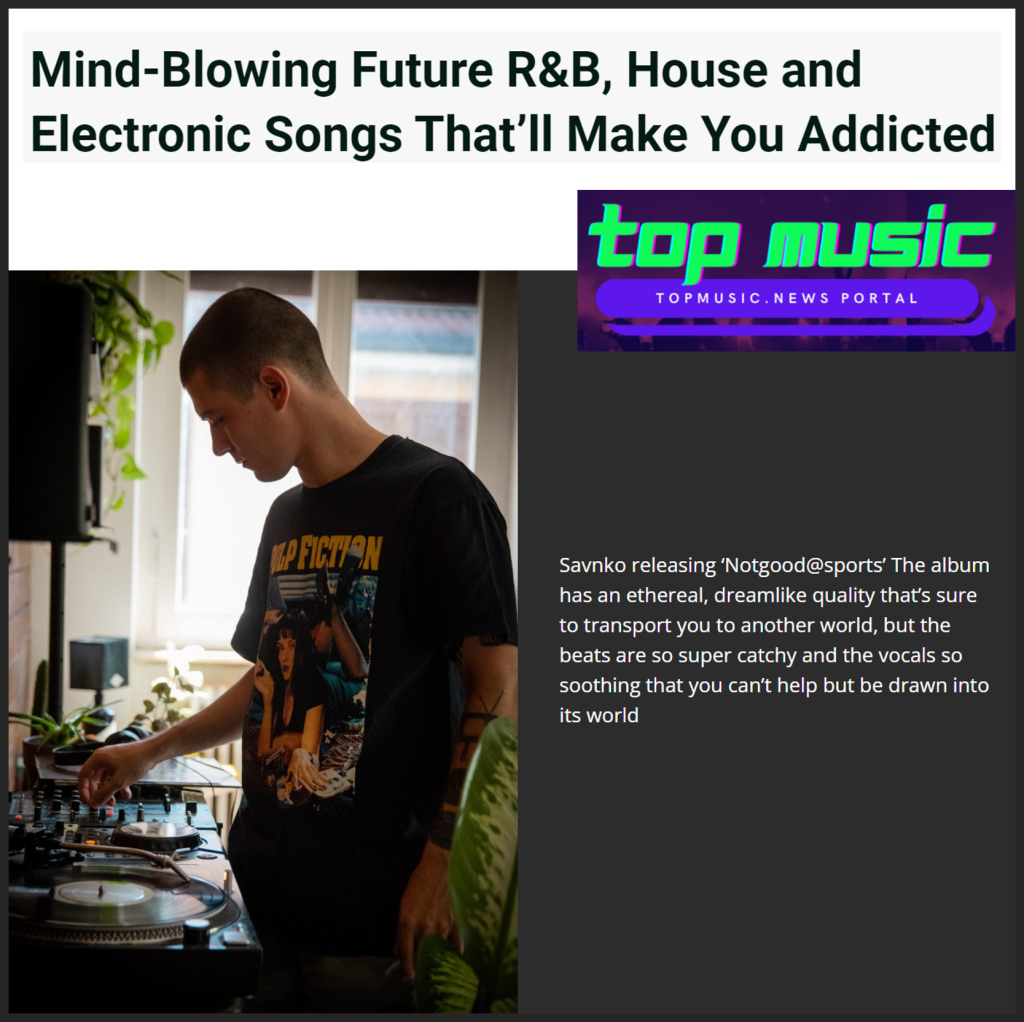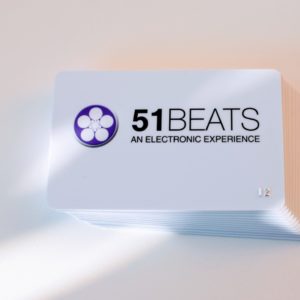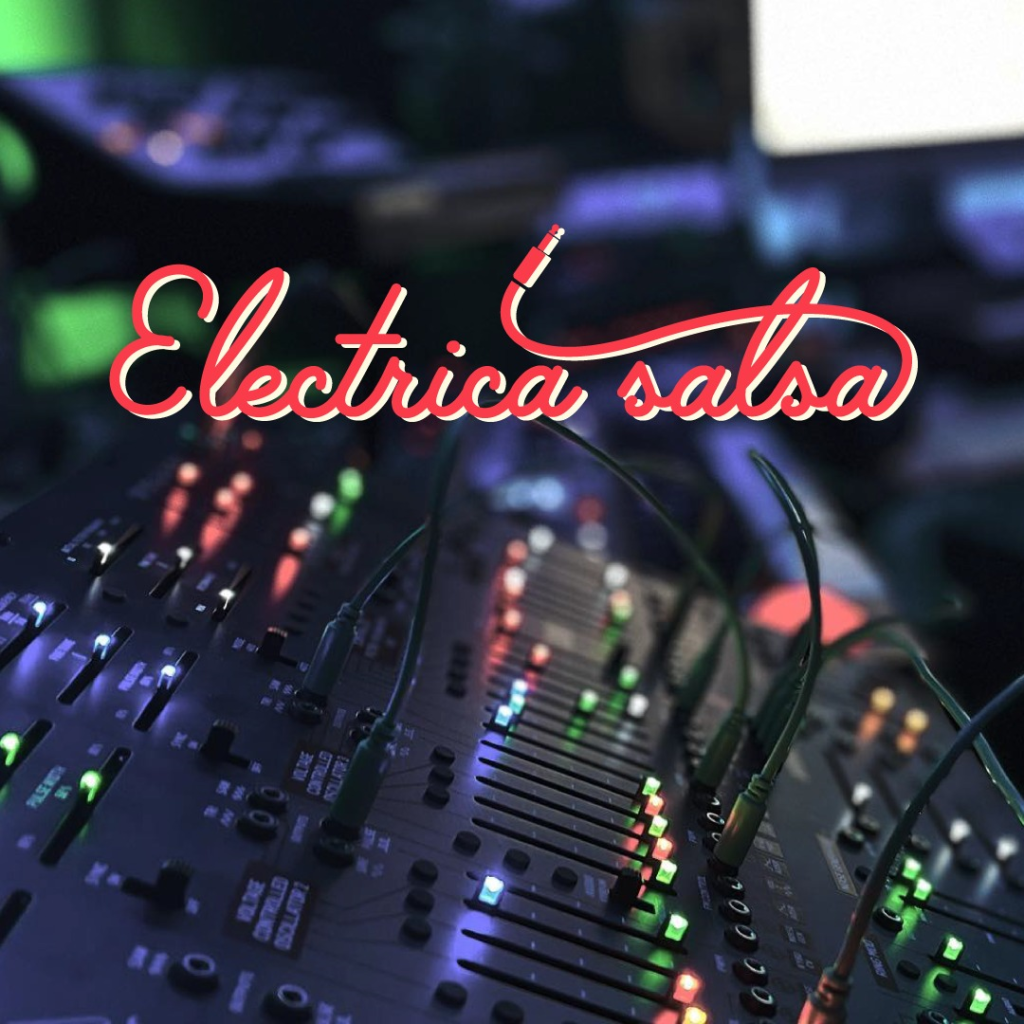“… Luca Umidi scolpisce onde nere su paesaggi che odorano di magma e polvere cosmica, lasciando che il tempo si diluisca in tre visioni, tre scenari di un altrove che vibra tra drone tellurico, armonie sommerse e derive magnetiche…” (Mirco Salvadori)
…Luca Umidi carves black waves across landscapes that smell of magma and cosmic dust, allowing time to dissolve into three visions—three scenarios of an elsewhere that trembles between tectonic drone, submerged harmonies, and magnetic drifts… (Mirco Salvadori)
[PODCAST] Ermete’s “ERMETE, 29°00′N 13°44′W (I-II-III)” deeply closes Pangea episode#275 @ The New Noise!
[REVIEW] ERMETE hits on Parkett Channel (IT)
[REVIEW] Tipografia Sonora su “Il Manifesto”
[51bts081] ERMETE: Ermete
04.04.2025 || Ambient, Drone
ERMETE (Luca Umidi) is an ambient/drone project that blends sonic exploration with dark, retro-futuristic tones, unfolding over a fluid and immersive droning foundation.
The debut self-titled album “Ermete” is composed of three distinct movements:
“29°00′N 13°44′W (I-II-III)“, the opening piece, is an extended composition divided into three parts. Its structure revolves around three evolving themes, emerging from a hypnotic and earth-shaking drone that underpins the entire track. Loosely inspired by volcanic landscapes of imagined, other world, it evokes an alien yet organic terrain.
“Magnetic Drift” flows like an ever-shifting tide, gradually building into a melody that floats atop the evolving sound mass, gaining strength and density as the track progresses.
“Distant” takes a more melancholic and introspective tone, with subtly shifting chords and melodies intensifying as the song reaches its peak.
The album was recorded entirely live, with minimal overdubs used sparingly to preserve the organic interplay between performance and sound modulation. This approach emphasizes spontaneity and a direct connection to the music’s essence. The result is an immersive journey across three distinct soundscapes, traversing dreamlike terrains and delving into deeply resonant inner vibrations.
Credits:Mixed and mastered by: Fabrizio De Felice
Cover art by: Fortuna Todisco
[PREMIERE] ERMETE generates a “…machine-crafted sonics that pulses with dark, atmospheric tones and eveloping drone textures…” (INVERTED-AUDIO, London)
[51vin006] Tipografia Sonora: Tipografia Sonora
24.01.2025 || Electronic, Nu-jazz, Contemporary Jazz
Tipografia Sonora is the charming fusion between the nu-jazz & electronic music project by the homonymous newly formed band, and the photography by the “Maestro” Mario Giacomelli. Tipografia Sonora discloses unprecedented prospectives to observe the Marche region, in Italy.
An exclusive 33” vinyl will be released the 24th of January 2025 with the contribution of NUOVOIMAIE. The release will be also available in its digital format in all stores.
Tipografia Sonora is composed by Michele Duscio (electronics), Leonardo Francesconi (piano) and Francesco Savoretti (percussion).
The premises from which the three musicians’ research work begins are the love for their land, the Marche, and the desire to add sound to the photos made by the world-wide recognized Senigallian photographer Mario Giacomelli (1925-2000), intertwining memory and innovation.
On the memory side, in particular, Savoretti has long been engaged in the study and rediscovery of the sounds and timbres of the various popular traditions of the Italian and Mediterranean area, placing greater attention on their functional and social value.
Duscio boasts a direct link with the life of Mario Giacomelli, thanks to childhood memories closely linked to his grandfather’s shoes-maker’s shop which was located a few meters away from the esteemed photographer’s Tipografia Marchigiana. This place, imbued with charm and creativity, now lives again in the group’s music.
In terms of innovation, the trio’s musical proposal starts from algorithmically generated random electronic sequences, which act as a changing basis for the improvisation and development of the songs, in the overlap of electronic and acoustic elements. An approach that may recall Floating Points, Plaid, Chilly Gonzales and Lambert. Like Giacomelli’s photographs, unpredictable and poetic, the music also evolves dynamically, gradually revealing new details and possible interpretations.
Tipografia Sonora declares: ‹‹ This album is a tribute to the photographer and artist Mario Giacomelli and is an attempt to translate his photographic poetics into music. Through a compositional stratification and the contrast between acoustic and electronic instruments we tried to re-propose those strong contrasts, those double exposures and superimpositions typical of some of his images, also feeling very close to his strong bond with the territory, often the subject of his art and his “visions” ››
On the other hand, Tipografia Sonora is much more than a mere musical transposition of Giacomelli’s photos: it is the valorization of the territorial context through a dialogue between arts, as capable of evoking emotions and narratives blending with the poetic essence of the photographer.
Credits:
All tracks were composed and played by Tipografia Sonora
Michele Duscio | electronics, synths, drum machines
Leonardo Francesconi | piano, synth
Francesco Savoretti | acoustic and electronic percussions
Recorded, produced and mastered by Michele Duscio at Studio Duscio in Macerata
Cover photo | Mario Giacomelli, Presa di coscienza sulla natura, 1970s, Courtesy Archivio Giacomelli © Rita Giacomelli
Graphic Editing | Andy Morello
Photo | Giovanni Ghiandoni
With the contribution of NUOVOIMAIE
Membership 2025 – NOW OPEN!
[REVIEW] QUBISM is reviewed at BLOW-UP Magazine #319!
[BOOK] 51Beats is mentioned in the new book “Advances in Quantum Computer Music”
[INTERVIEW] Eduardo Miranda discusses Qubism with the hystoric music magazine SPIN (U.S.)!
Sounds like: The intersection of artificial intelligence and human emotion converging in a, yes, luminous groove that makes the listener long for the heyday of Ninja Tune and Mo’ Wax.
“We are on the verge of a technological revolution driven by AI and quantum computing.” … “Quantum computers process information in alternative ways and this will most probably lead to new kinds of AI. We will see music technologies enabling us to create music and arts differently. I don’t know what these will be like.”
[51bts080-51VIN005] Eduardo Reck Miranda: QUBISM
25.10.2024 || quantum, classic, avantgarde, electronic
The first Quantum Computer Music release!
QUBISM features compositions created with quantum computers. It results from Miranda’s research into harnessing emergent quantum computing technology to compose.
>> EDUARDO RECK MIRANDA’S INTRODUCTION TO QUBISM (Digital version) <<
While having learned classical musical instruments since childhood, my preferred tool for composing is the computer. I have been delving into Artificial Intelligence (AI) and innovative computing methods for composition for some time now. An intelligently programmed computer can collaborate in the creative process, offering fresh insights and ideas beyond my own.
Lumina Grooves #1, #2 and #3 are three renderings of a multifaceted piece commissioned for the festival Komplementārās pretrunas (Complementary Contradictions, in English), which took place in Riga, Latvia, in 2023.
I developed with my team a piece of software for a photonic quantum computer to deconstruct a given piece of music and deduce algorithms to reconstruct it from its bare bones. To begin with, I wrote a short composition scored for a chamber ensemble. It was in a minimalist style, inspired by the work of American composer Philip Glass. Then, I inputted the piece into the photonic software for processing.
Every time I ask the photonic computer to produce a new composition, the results will always be distinct. This is due to the statistical nature of the deduced algorithms and the inherent stochasticity of quantum computers. Metaphorically, it is as if Lumina Grooves lives in a multiverse with many observable versions.
Spinnings and Swirling Qubits are live recordings played with the Q1Synth instrument. Q1Synth is a software sound synthesiser that makes sounds with a qubit. The qubit is visualised on the computer monitor as a sphere. A continuously changing sound is produced while rotating the sphere with a peripheral, such as a mouse. At specific times, Q1Synth communicates with a quantum computer on the cloud to process the qubit. This results in an unpredictable dynamic sound.
For the rendition of Spinnings, three performers played a Q1Synth each using wireless gloves and rings. For Swirling Qubits, a performer donning a sleeve made with smart textiles played the piece with choreography information relayed wirelessly to four Q1Synth instruments.
The piece Zeno 2.0 is for alto flute, bass clarinet and electronically synthesised sounds. I composed the score for the acoustic instruments manually, without the aid of a computer. I meticulously scored the production of multiphonics. I leveraged the alto flute and the bass clarinet, which are monophonic instruments, to produce two or more pitches simultaneously.
Quantum computers were used in Zeno 2.0 to synthesise the electronic part and to produce responses to the alto flute and bass clarinet during the performance.
The electronic part for Zeno 2.0 was crafted in the studio beforehand for playback on the stage. Conversely, the responsorial interaction between the instruments and a quantum computer happened in real time. A music AI system listened to both instruments and used quantum mechanics to produce musical responses during the performance. The quantum computer acted as a buddy musician interacting with the performers, as if in a contemporary jazz-like gig.
>> EDUARDO RECK MIRANDA’S INTRODUCTION TO QUBISM (Vinyl version) <<
The composition Qubism, for chamber orchestra and electronic sounds, comprises three tracks entitled Observe, Interact, and Revisit. Here I programmed a quantum computer to generate data patterns, which I manually converted into a musical score. I also synthesised the electronic sounds using these patterns.
It is fascinating that a quantum computer enabled me to design arrangements that produced unique timbres in Observe and Revisit. Although the second track may sound conventional compared to the others, Interact features moments where a quantum computer on the cloud responds to the violin during the performance. These responses, generated with quantum AI software, are heard on a synthesised saxophone and percussion.
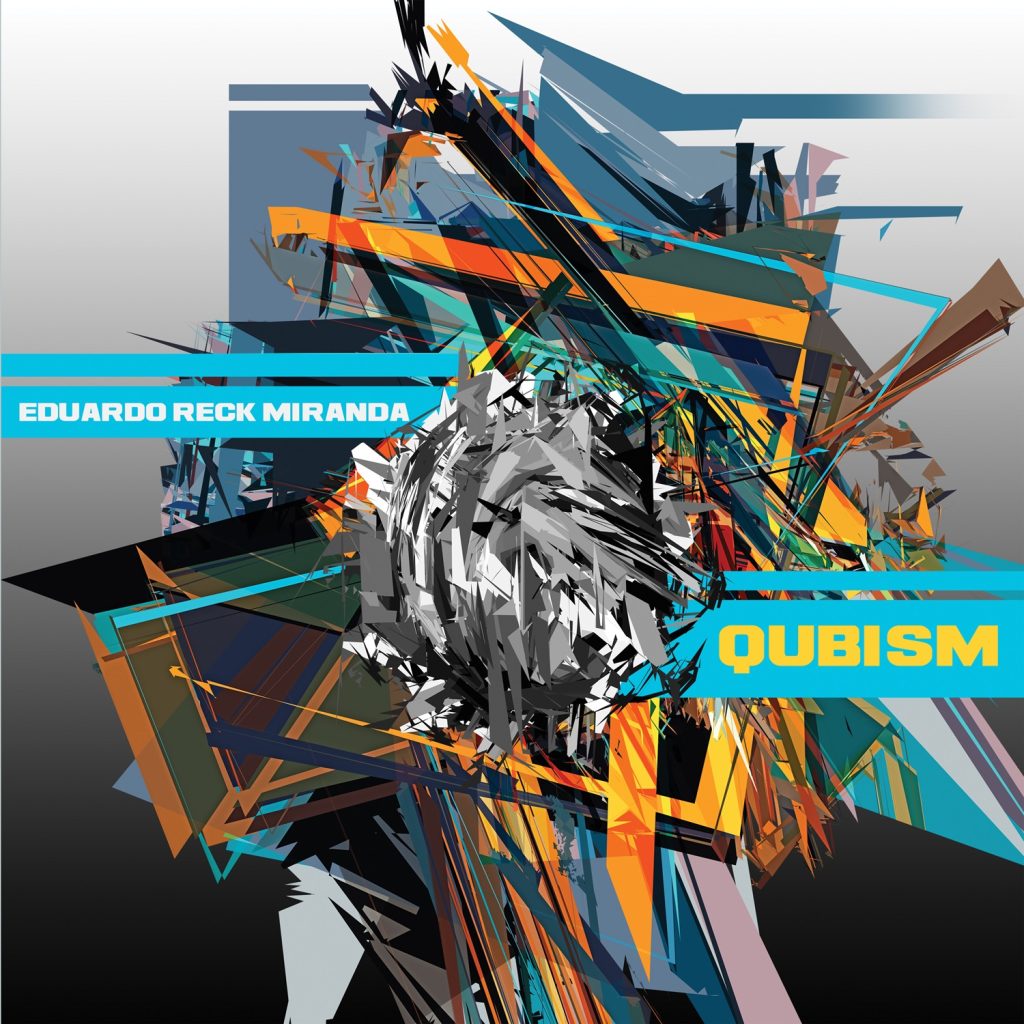
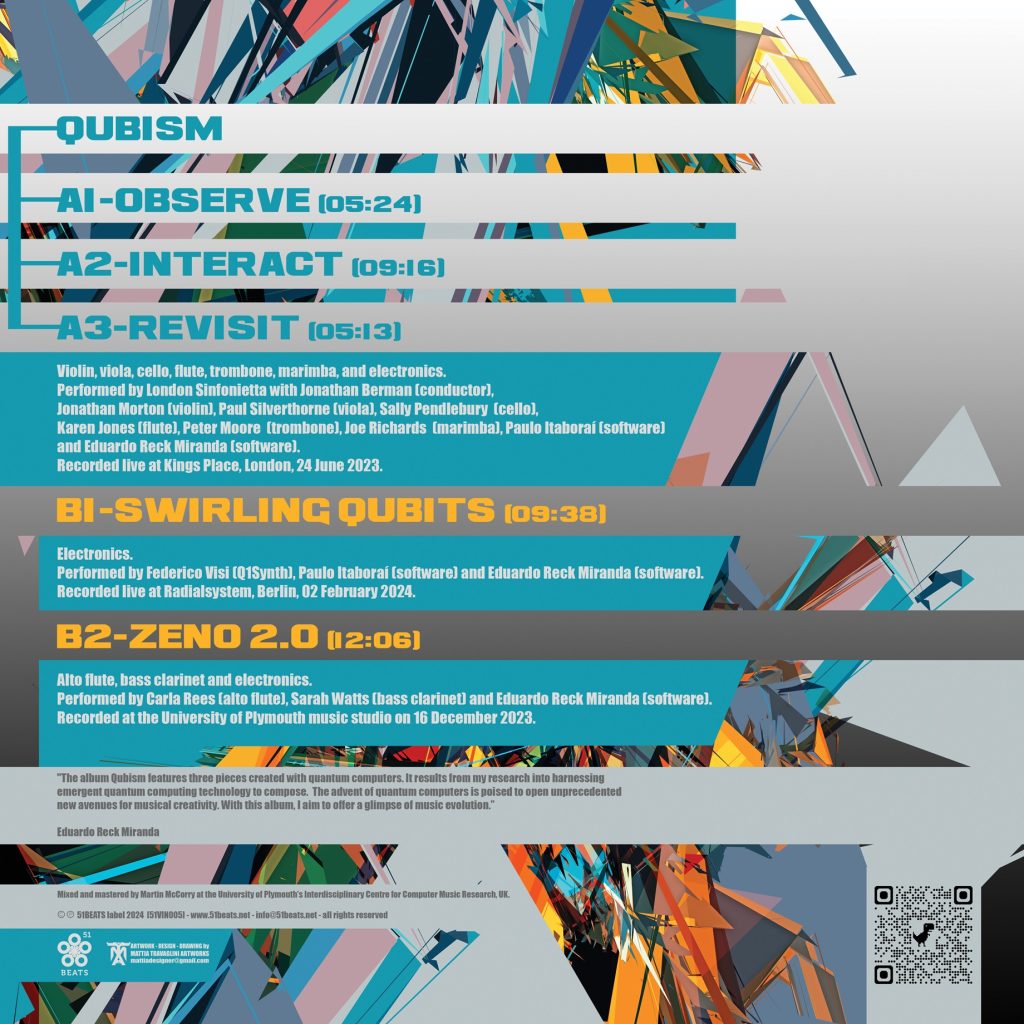
Artwork, Design, Drawing by Mattia Travaglini Artworks
>> CURRENTLY VINYLS ARE NOT COMMERCIALLY AVAILABLE. THEY WILL BE AVAILABLE AT SPECIAL EVENTS <<
[PREMIERE] QUBISM by Eduardo Reck Miranda skyrocketing at FORBES (U.S.)!
“Pushing Music’s Limits!”
“Qubism pulsates with a shrill, dissonant urgency,…”
“…the first ever album composed using AI and quantum computing technology…”
[REVIEW] Music For All (Brazil) catched up the “majestic presentation of colors and sensations” in Tonylight’s album “Lumanoide”…
[REVIEW] Tonilight’s “Lumanoide” lands in Brazil @Roadie Music!
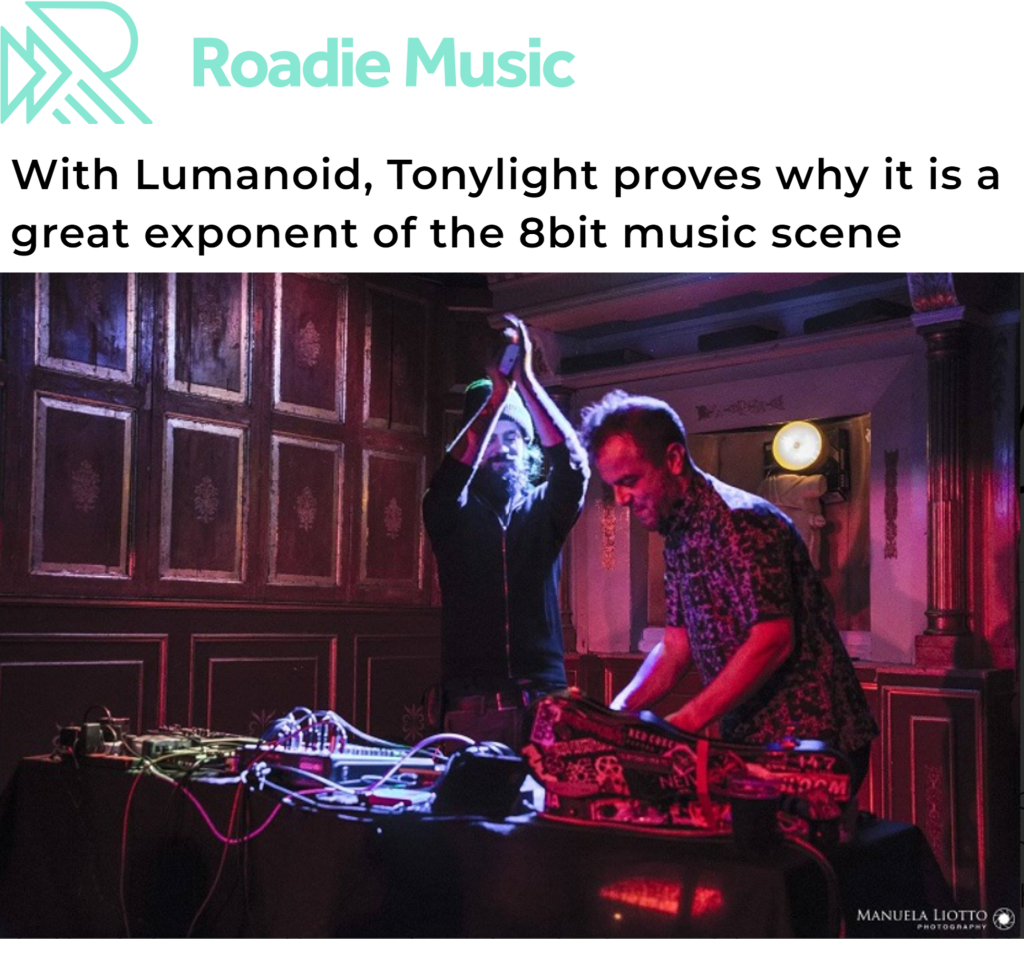
“Tonylight made Lumanoide an infectious album in its dancing vein through its acidic, strident and sweet sounds. Flirting with house music and taking the form of a synonym for chiptune, the 8bit present here makes the listener even – and sometimes – have the impression of being inside the universe of video games.”
[51bts078] Tonylight: Lumanoide
09.05.2024 || 8bit, Chiptune, Acid, Techno
Tonylight, a genuine master of the 8bit music scene, takes the advantage of his long-standing experience in the sound machines’ design and production within LEP (“Laboratorio Elettronico Popolare”), to constantly change his set-up to shape new tracks, always maintaining a characteristic pure analogue and instinctive approach in all his compositions.
“Lumanoide” sounds raw, acid and old-school, with unsettling dynamics and motorik rhythms. This latest album by Tonylight can be viewed as a fully-matured version of the previously produced albums that were almost entirely based on the use of Gameboy and Nanoloop. The creative verve is the same, but the sounds are full-bodied, deep, intense, and obtained by exploiting a recently produced Danish groove-box to its limits. Lumanoide is inspired by the unforgettable nights in the clubs of the 90s, and all tracks are 120 bpm, in homage to the Marco Dionigi’s “slow motion” djsets.
The name of the album comes from “Lumanoise”, one of the synths produced by LEP, of which Tonylight is one of the founders.
Credits:
Music by Antonio Cavadini (aka Tonylight)
Cover Art by Danilo Vadis
[PODCAST] Syndae Episode#716 premieres Tonylight’s KKUCI & Morello’s GHOST!
[PREMIERE] KKUCI premiered @TUCCA (Buenos Aires)!
[OUT SOON] TONYLIGHT: “Lumanoide” out 9th of May —> get a pill @Cyberland Radio-show!
[REVIEW] IGGY Magazine introduces Morello’s Emotions …
[REVIEW] Morello’s “Fronteras de lo vintage y lo futurista…”
[REVIEW] Andy Morello “…contagia con un intenso ritmo… (End Sessions, Mexico)
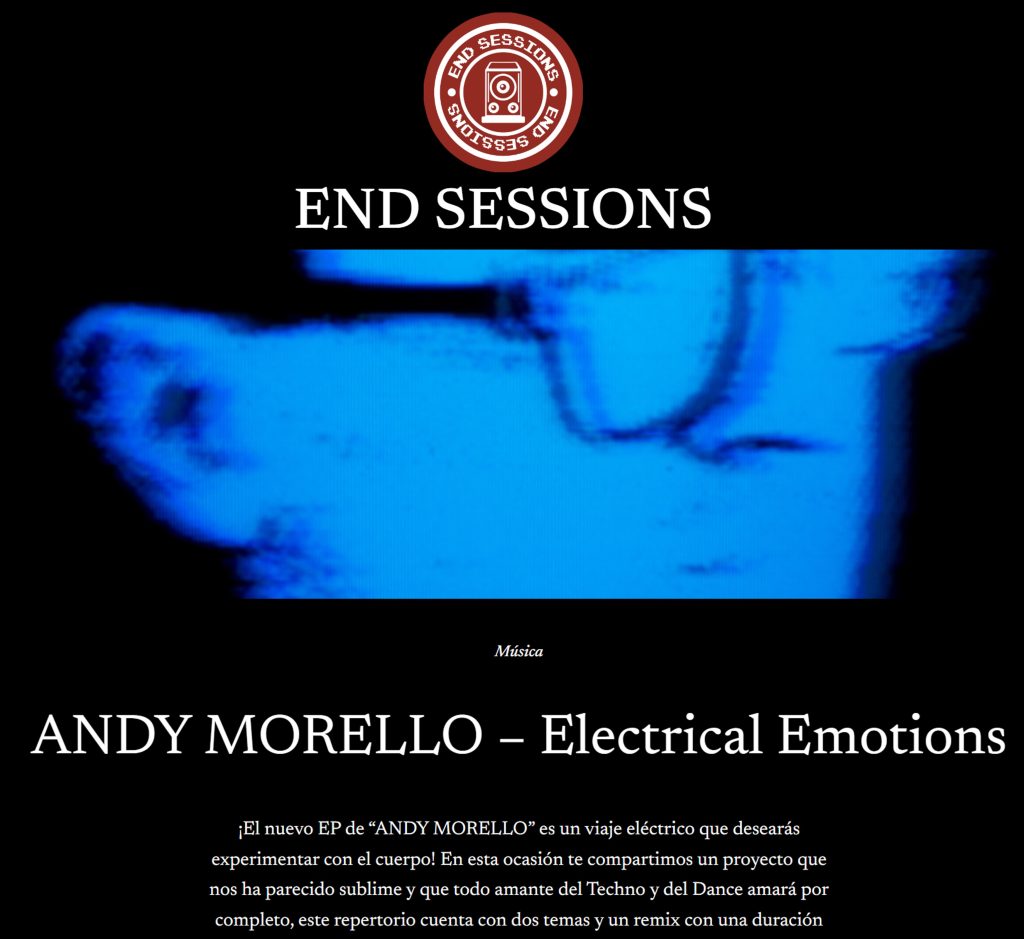
““Electrical Emotions” tiene una esencia muy singular, se mantiene fiel al estilo clásico del género y regala una experiencia como ninguna otra….”
“…un viaje eléctrico que desearás experimentar con el cuerpo! “
“…. una melodía enérgica hace que la atmosfera se oscurezca y se llene de asombrosos destellos sonoros….”
[REVIEW] “Electrical Emotions” expands and evolutes your mind (Music for All, Brazil)
[REVIEW] Andy Morello discovered @INFO MUSIC (France)
[51bts077] Andy Morello: Electrical Emotions
[PODCAST] Morello’s “Electrica” included in the 709th episode of Syndae!
[Premiere] The forthcoming “Electrical Emotions” modular-techno EP by Andy Morello now premiered @TUCCA (Buenos Aires)!
[REVIEW] Cirro: Monstera – un “Delirio digitale fra archetipi e tecnologie” (Il Manifesto)
[51bts076] Cirro: Monstera
Become a Member now!
[51bts074] Plasman: Variable Mira
[PREMIERE] Plasman’s “Neon Plant” at Inverted-Audio (London)
Become a 51Beats Member 2023 to instant download Joao Ceser’s BRZ, Gravity and Quantum Mechanics 3 and … very soon …. the Adriano Canzian comeback!
[OUT NOW] Gravity and Quantum Mechanics 3 [CD & digital]
[REVIEW] Joao’s BRZ @No Transmission “Let’s call it poetronic!”
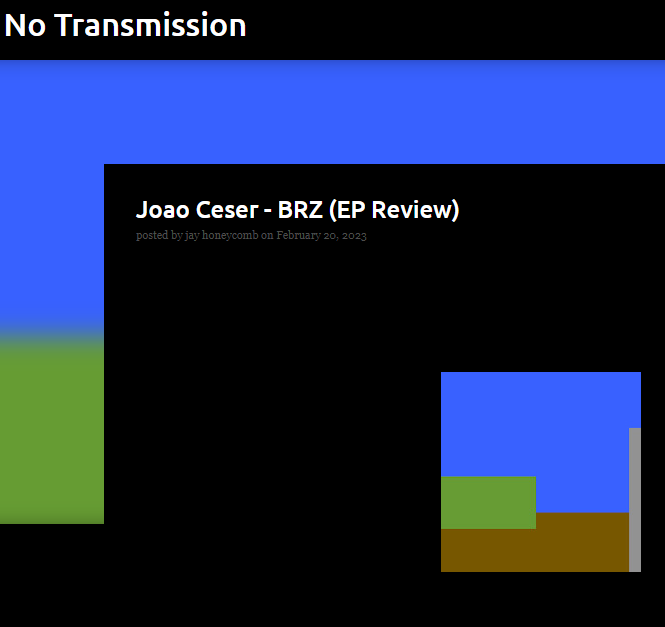
Let’s call it poetronic!
[REVIEW] Savnko’s notgood@sports at Top Music News!
Membership 2023 is OPEN!
[REVIEW] notgood@sports by Savnko @Senocular Media
[PREMIERE] “Culprit” by Tracya @Electrica Salsa (Radio 20158)
[VIDEO PREMIERE] “Mindflux” by Tracya @Moskalus channel
[51bts071] Savnko: notgood@sports
Become 51Beats Member 2022!
You will:
- Free-download all the music released in 2022 (1STR1C3, Dj Barefoot, and more to come….)
- Free-download our first 4 releases by Gollywop, Spectacular Synthesizer, Kamikaze Deadboy and Keibe
- Free-download VV.AA: Modular Cuisine
- Get your Digital-Card to access benefits at our partners (in constant update)
[51vin004] VV.AA. Modular Cuisine
24.09.2021 || electronic, electro, ambient, techno
MODULAR CUISINE is an event, a vinyl, a charity auction.
During the event, our artists “interpret” local food with live exhibitions. An exclusive vinyl is jointly released, and during the event uniquely-painted copies are exhibited in the framework of a charity auction.






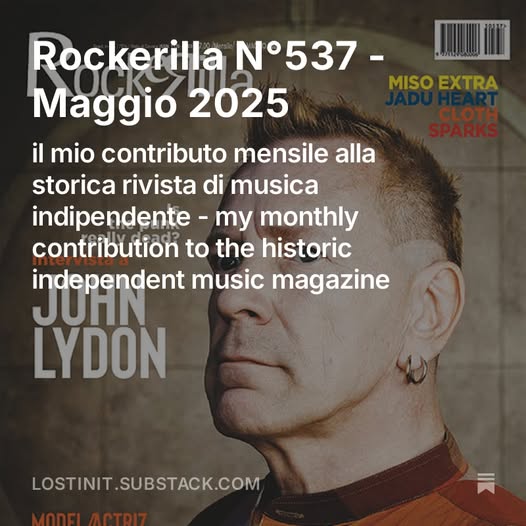
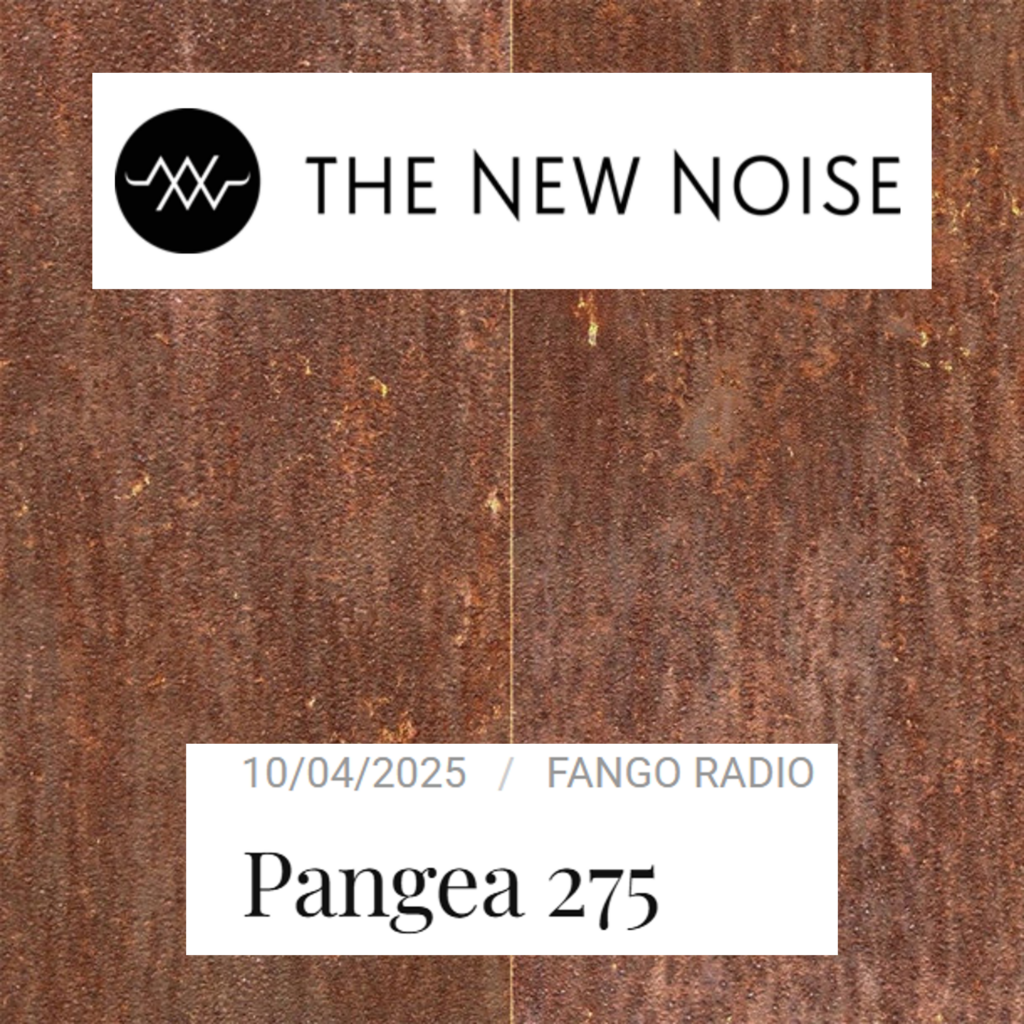
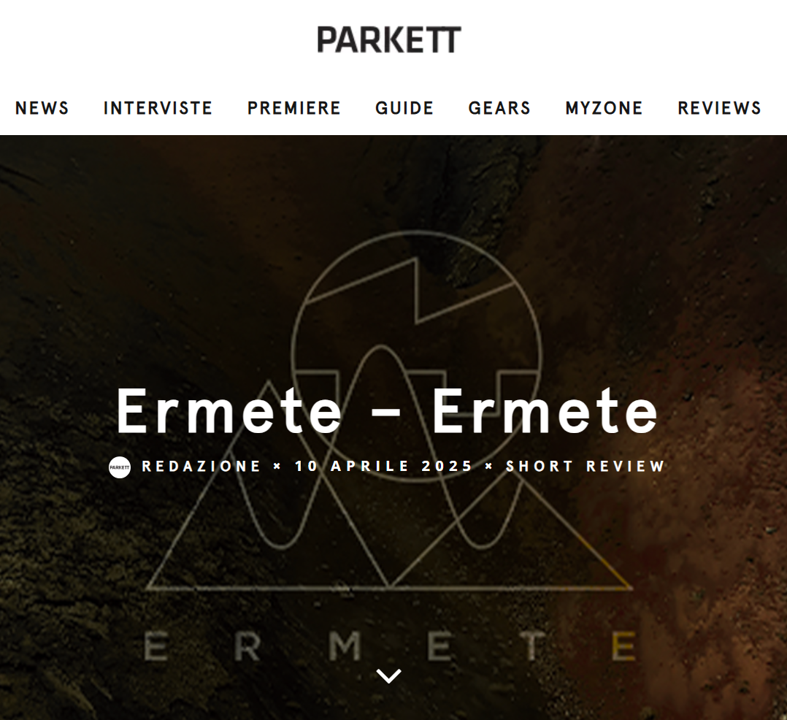
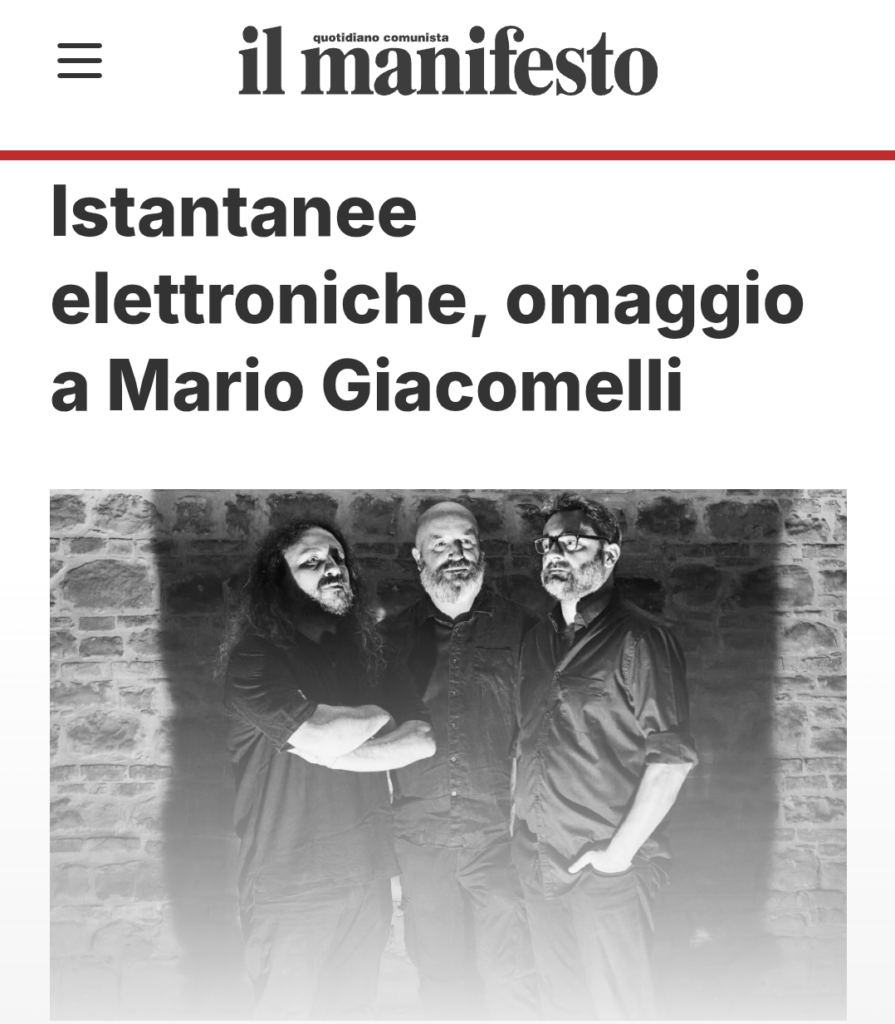
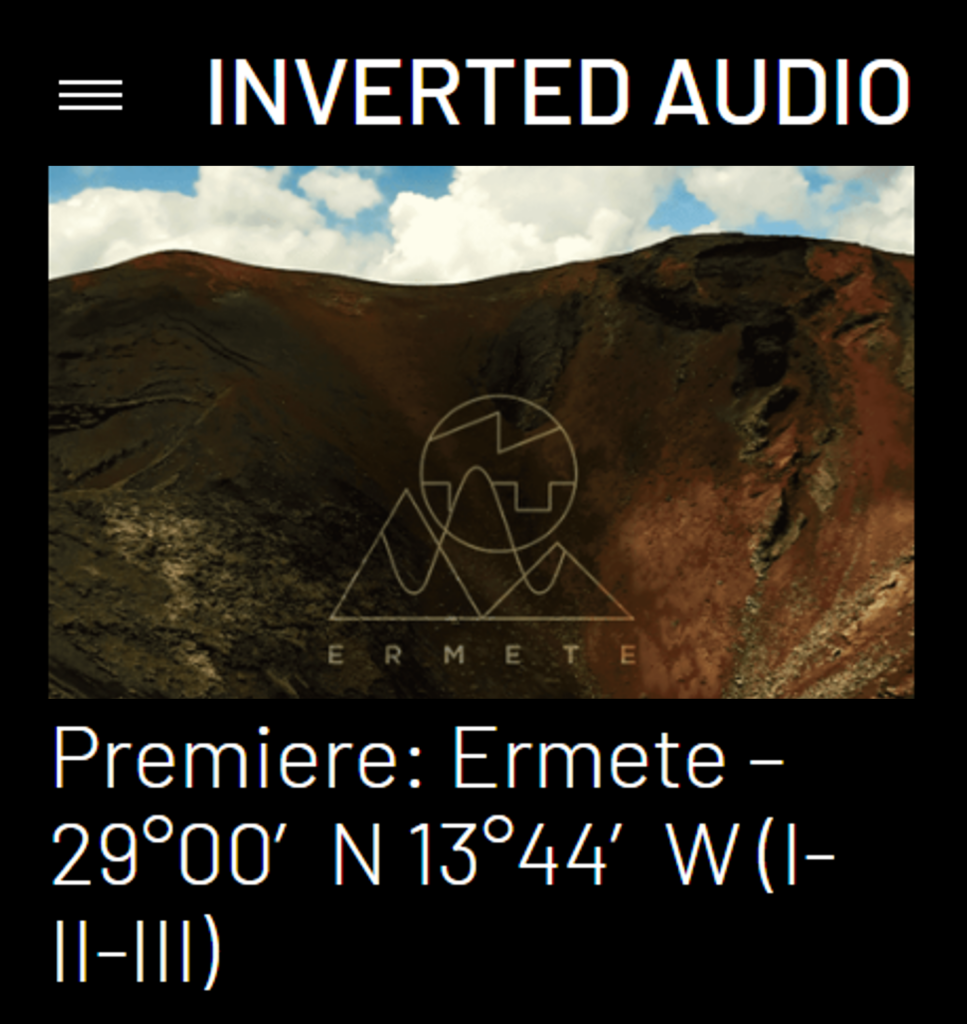

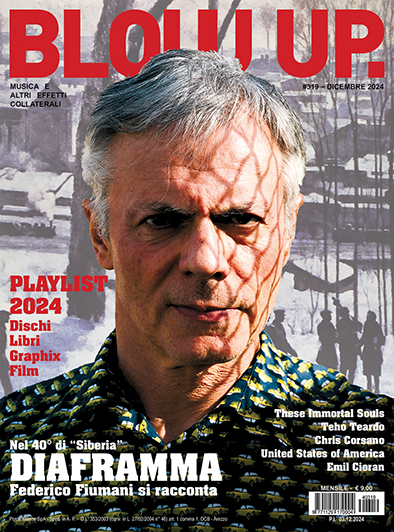
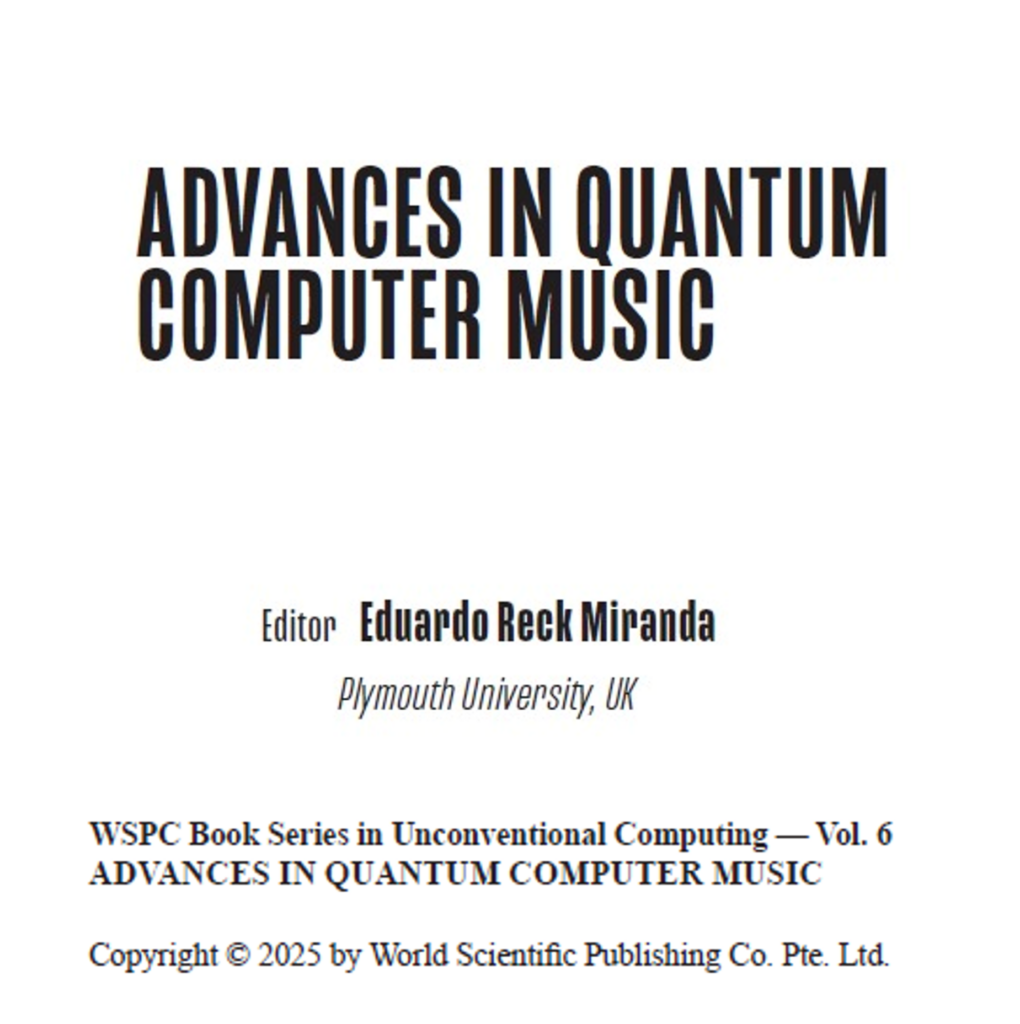
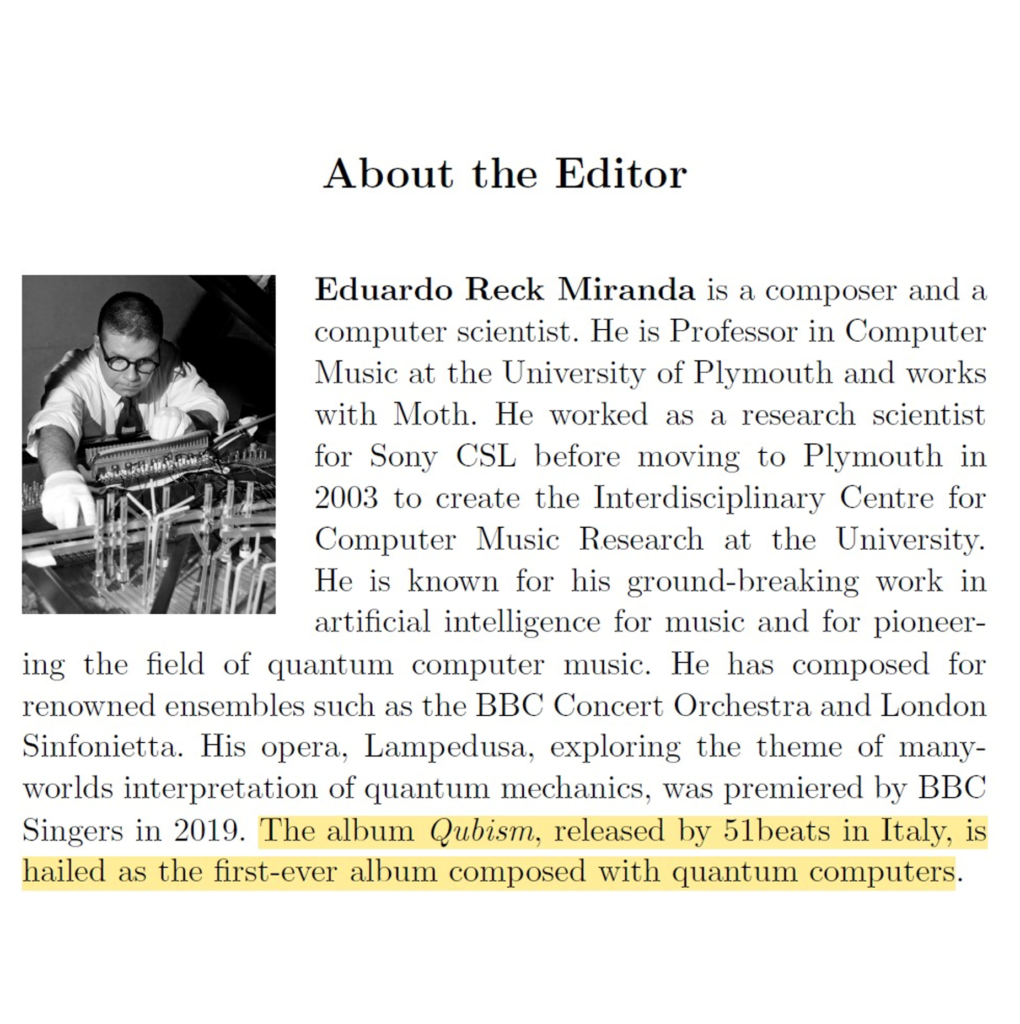
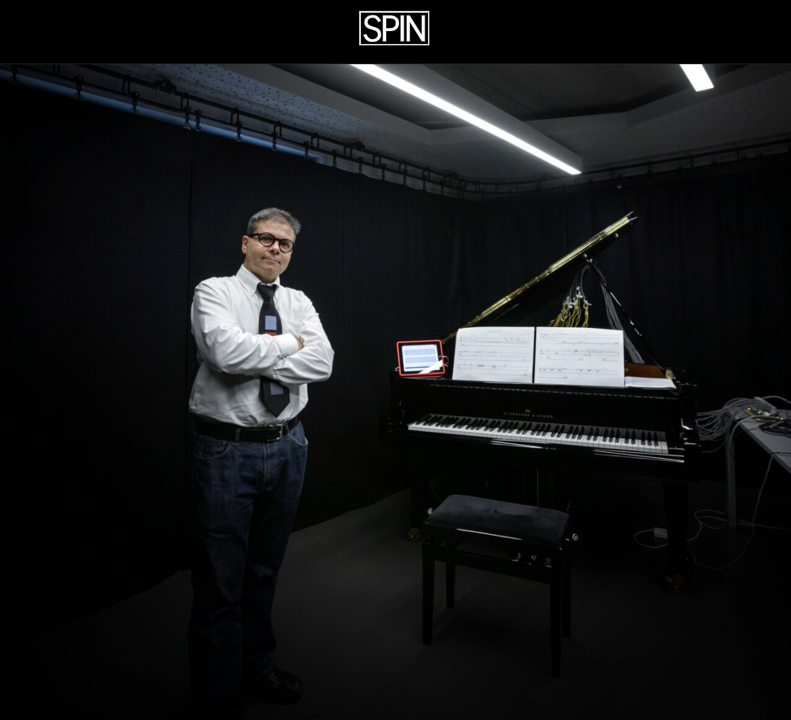
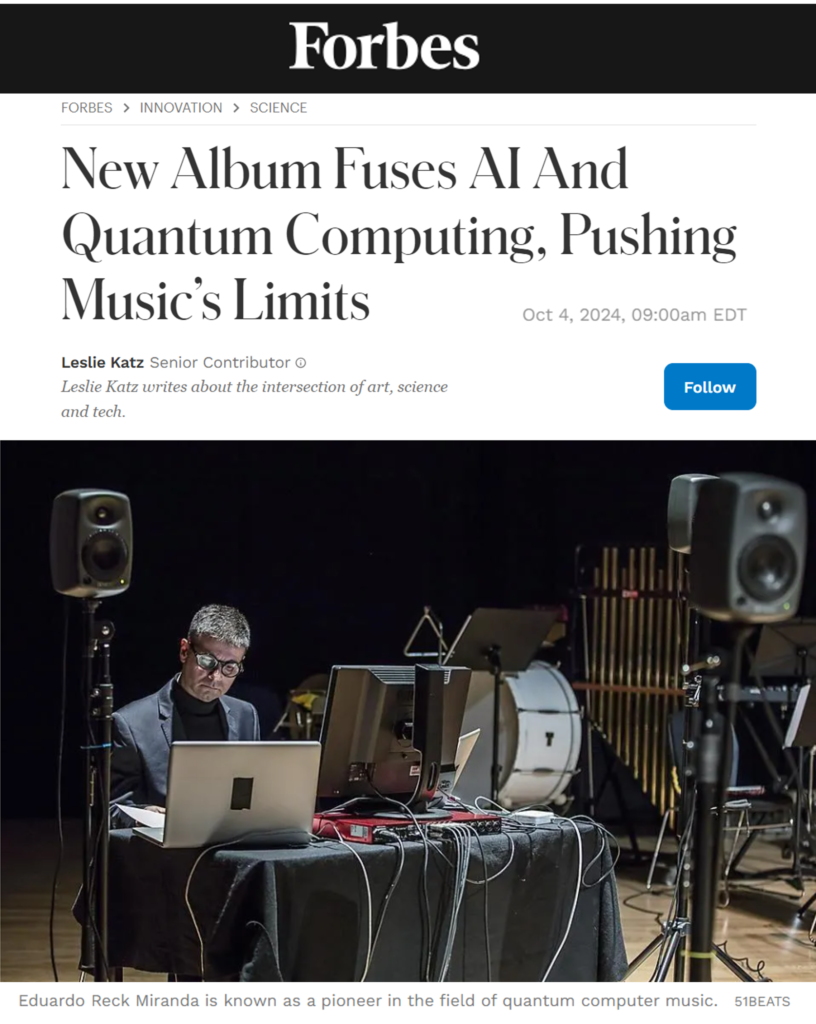

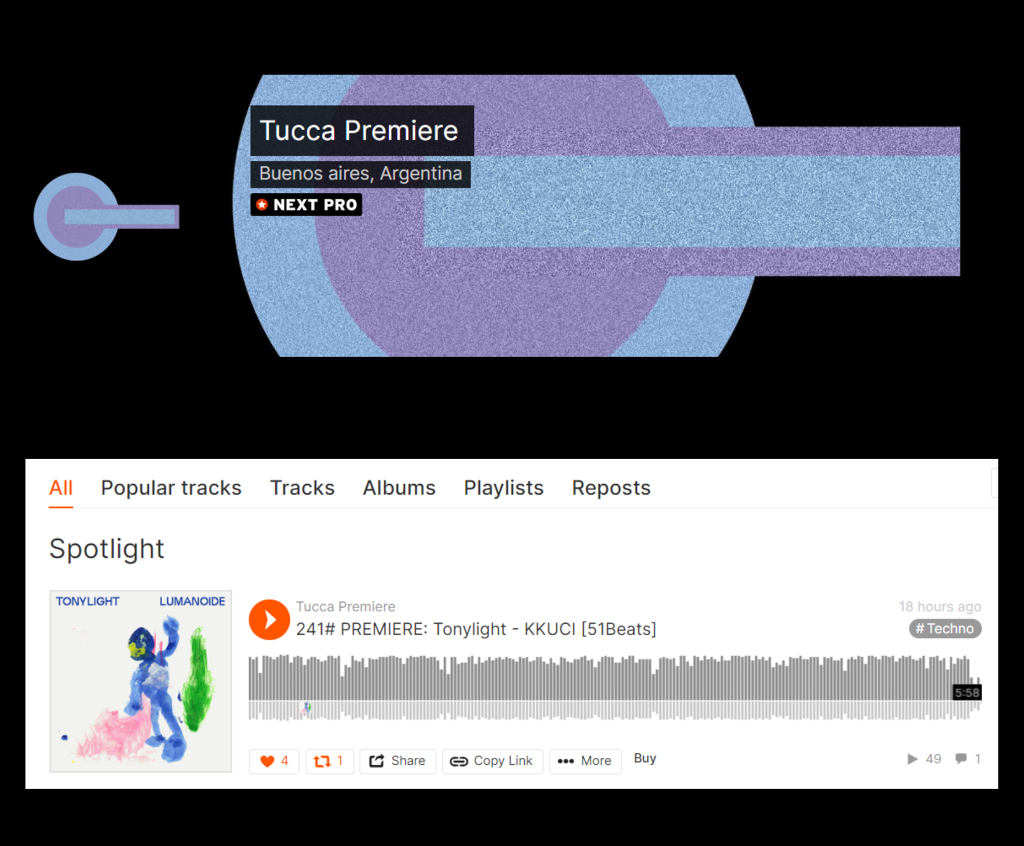
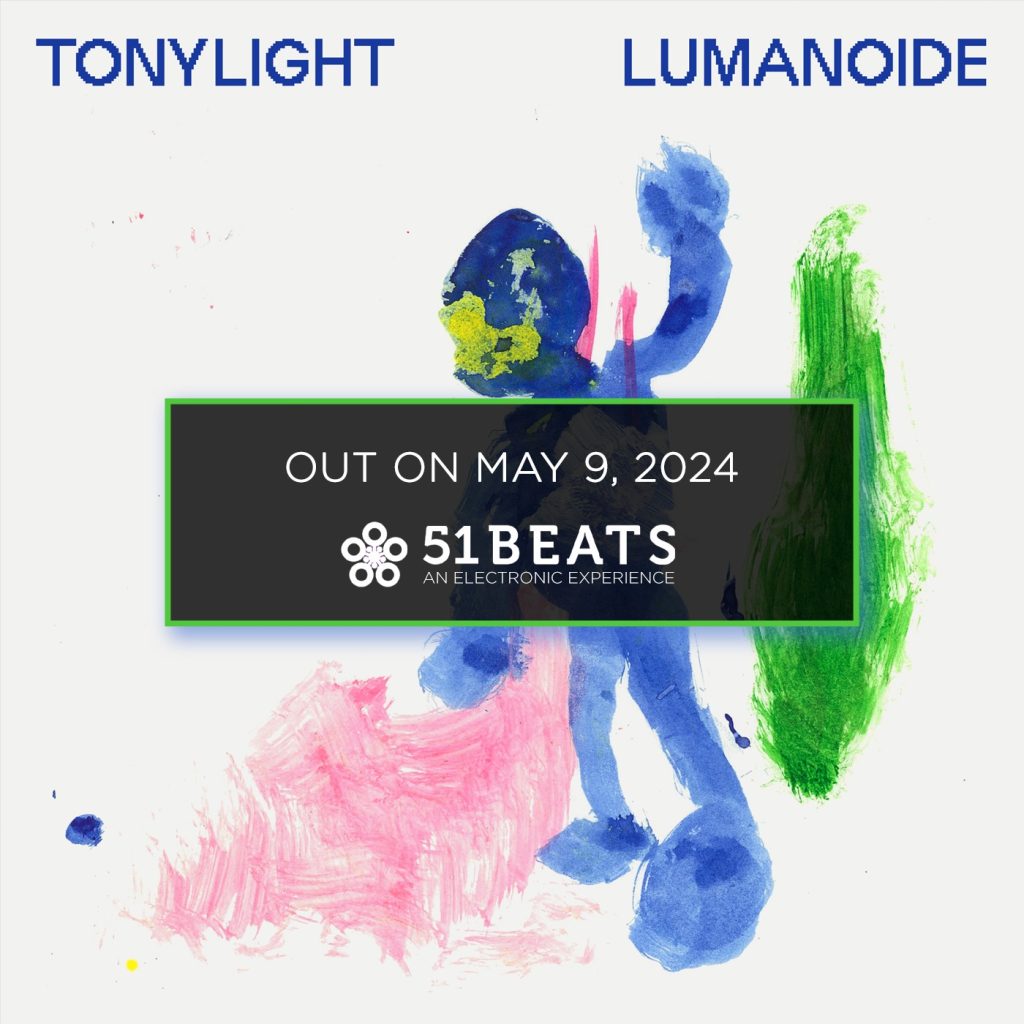
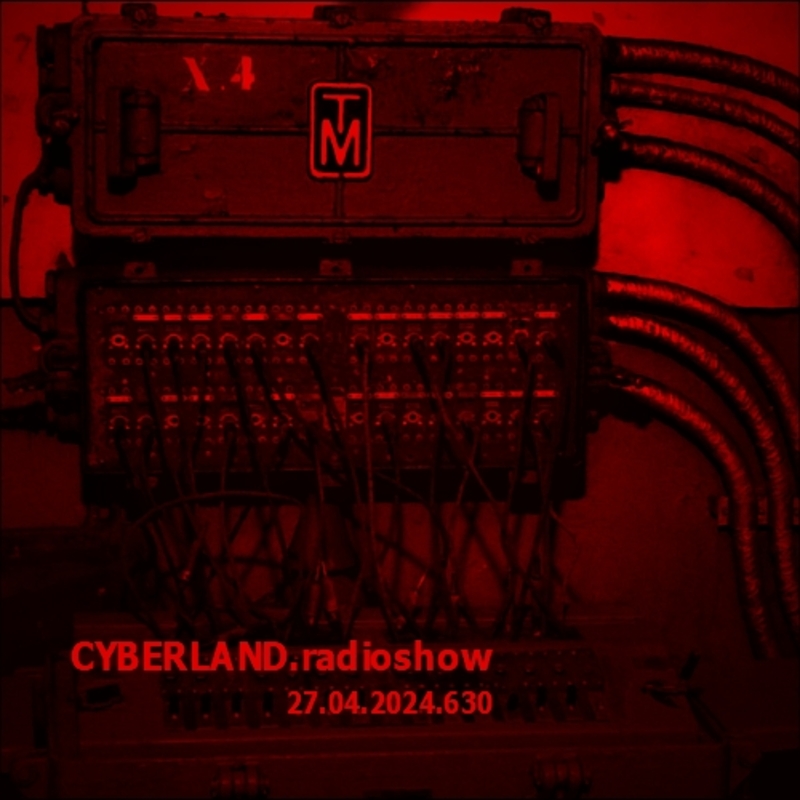
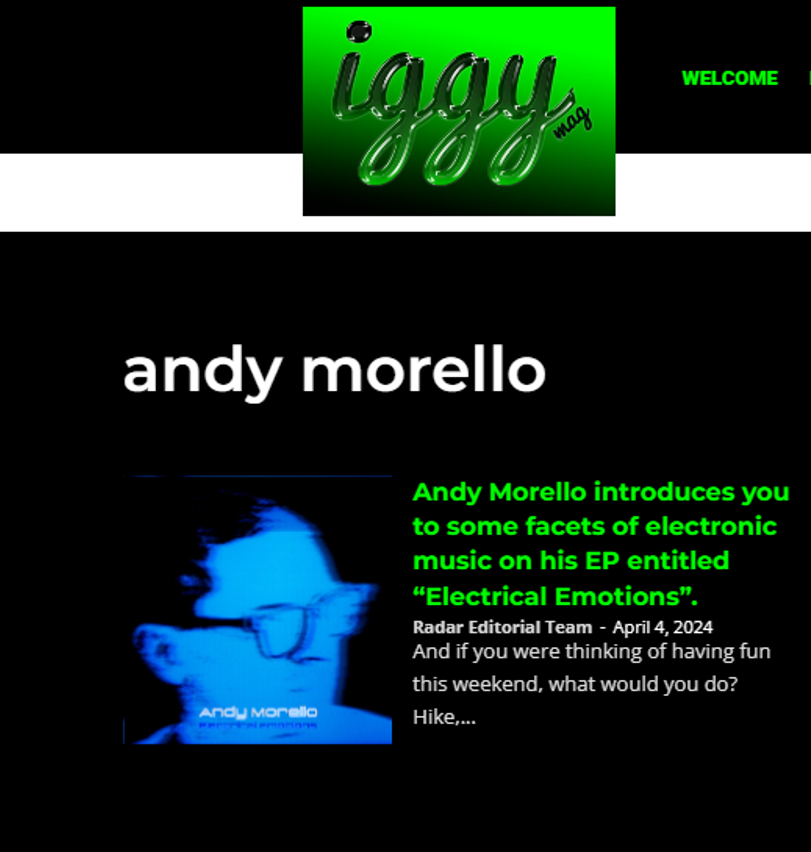
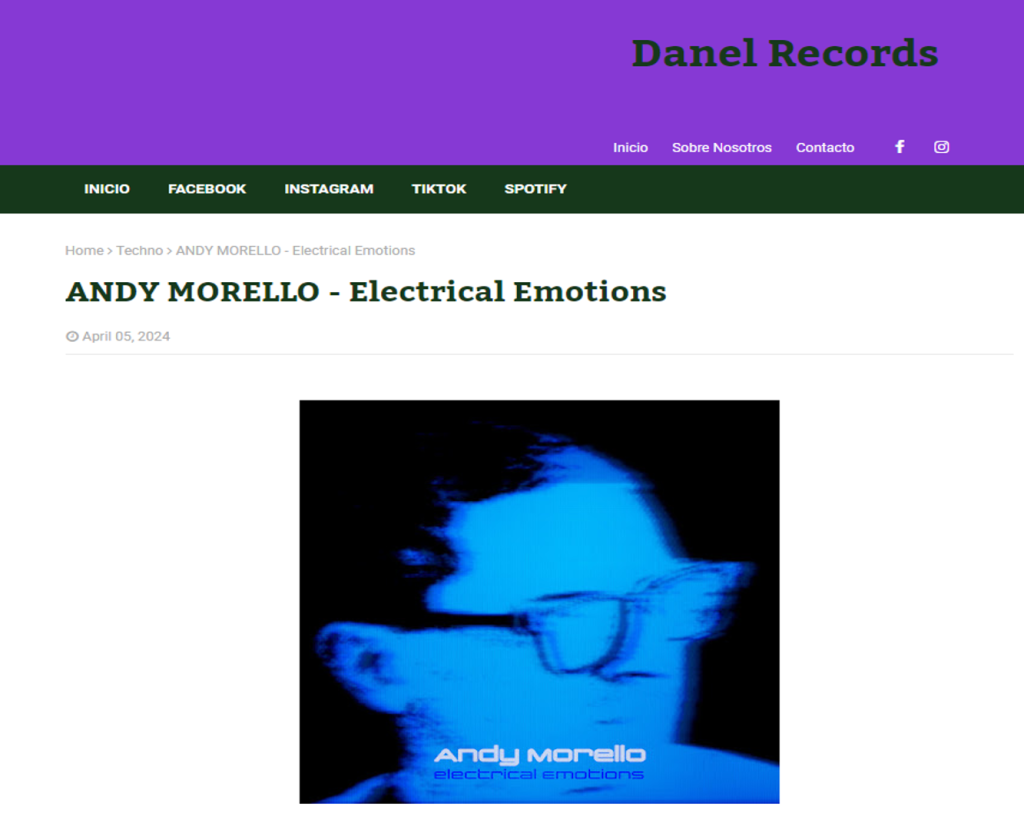
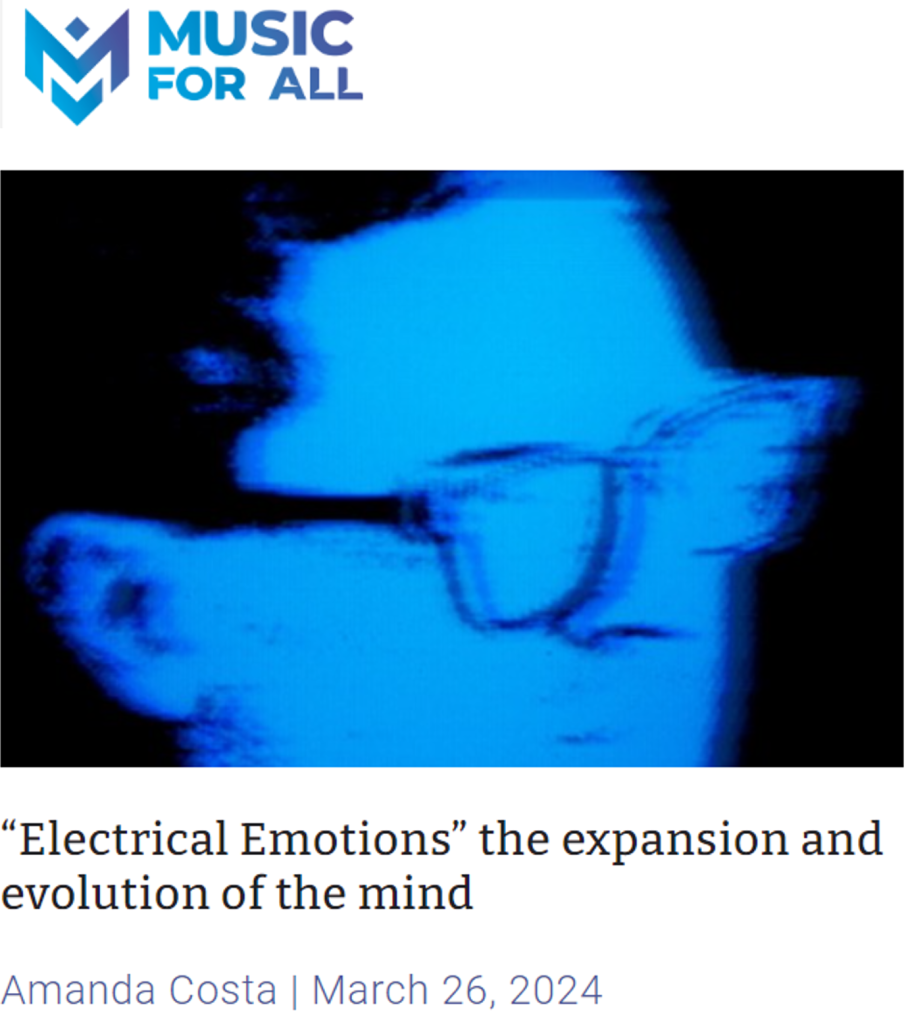

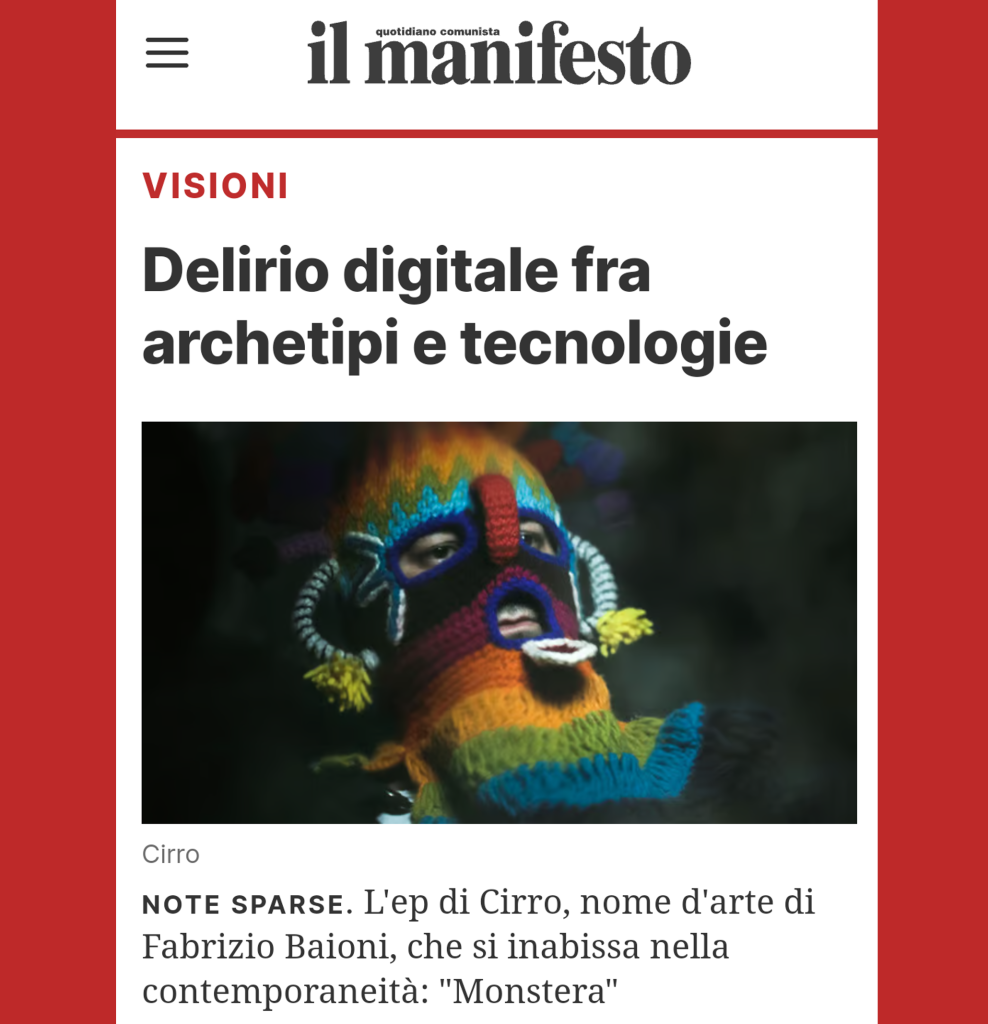



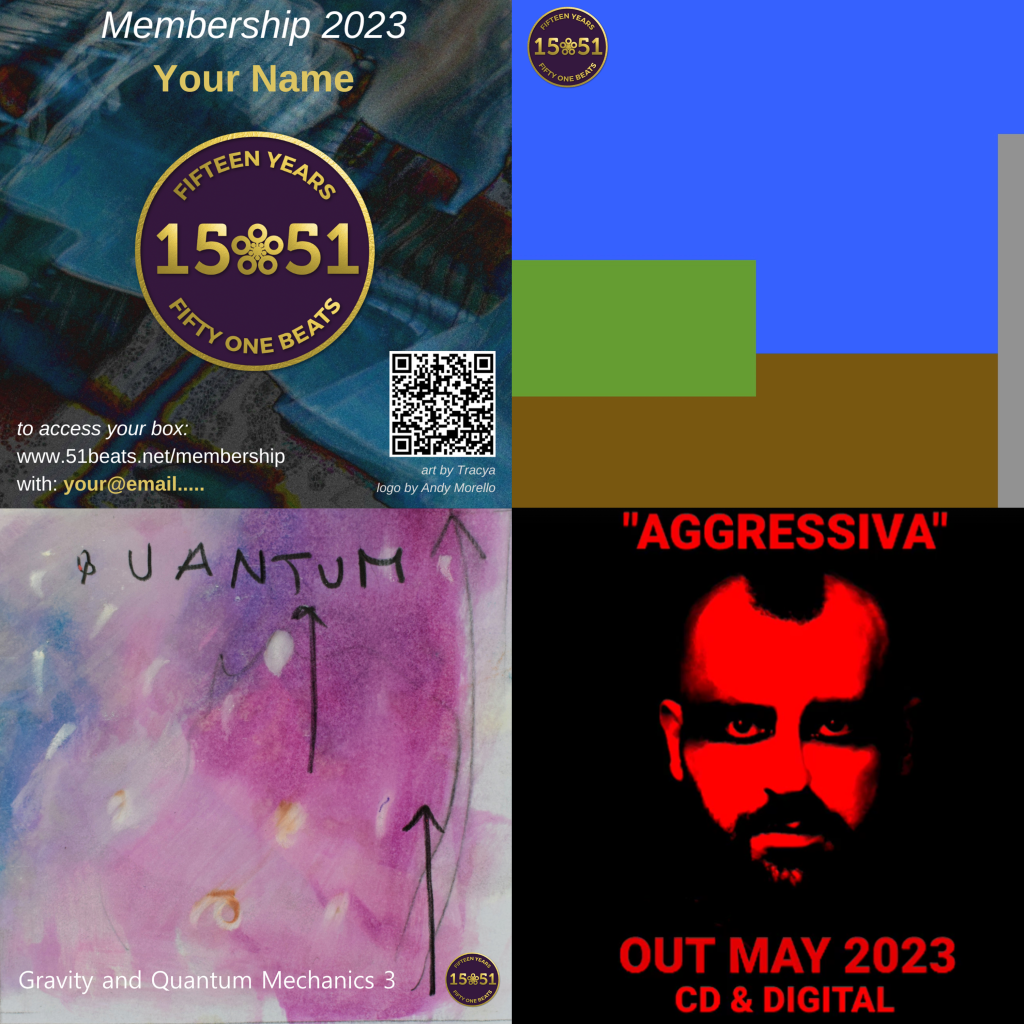
![[CD] VV.AA Gravity and Quantum Mechanics 3](https://www.51beats.net/wp-content/uploads/2023/03/DSC_3950-300x300.jpg)
